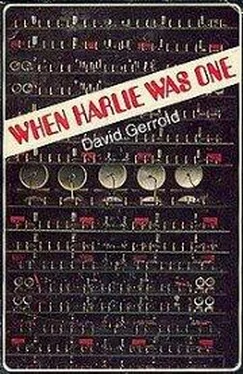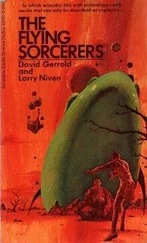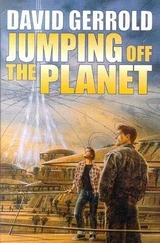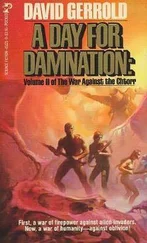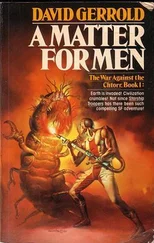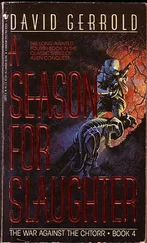David Gerrold - When HARLIE Was One
Здесь есть возможность читать онлайн «David Gerrold - When HARLIE Was One» весь текст электронной книги совершенно бесплатно (целиком полную версию без сокращений). В некоторых случаях можно слушать аудио, скачать через торрент в формате fb2 и присутствует краткое содержание. Год выпуска: 1972, ISBN: 1972, Издательство: Doubleday, Жанр: Фантастика и фэнтези, на английском языке. Описание произведения, (предисловие) а так же отзывы посетителей доступны на портале библиотеки ЛибКат.
- Название:When HARLIE Was One
- Автор:
- Издательство:Doubleday
- Жанр:
- Год:1972
- ISBN:978-0345028853
- Рейтинг книги:3 / 5. Голосов: 1
-
Избранное:Добавить в избранное
- Отзывы:
-
Ваша оценка:
- 60
- 1
- 2
- 3
- 4
- 5
When HARLIE Was One: краткое содержание, описание и аннотация
Предлагаем к чтению аннотацию, описание, краткое содержание или предисловие (зависит от того, что написал сам автор книги «When HARLIE Was One»). Если вы не нашли необходимую информацию о книге — напишите в комментариях, мы постараемся отыскать её.
Nominated for Nebula Award for Best Novel in 1972.
Nominated for Hugo Award for Best Novel in 1973.
When HARLIE Was One — читать онлайн бесплатно полную книгу (весь текст) целиком
Ниже представлен текст книги, разбитый по страницам. Система сохранения места последней прочитанной страницы, позволяет с удобством читать онлайн бесплатно книгу «When HARLIE Was One», без необходимости каждый раз заново искать на чём Вы остановились. Поставьте закладку, и сможете в любой момент перейти на страницу, на которой закончили чтение.
Интервал:
Закладка:
“Ah, yes — but HARLIE’s got a vested interest in the project.”
“Why not?” said Auberson. “It’s his project, not mine. He’s the one who’s presenting it to the Board for approval.”
“And it’s sure to be voted down.” The Chairman looked at the back of his hand. “I can’t see any way that this will be approved. I’m not even sure we should being it up.”
“It’s too late,” said Auberson. “You’re going to have to bring it up. And you’re going to have to give it a fair hearing. You told HARLIE to come up with a way to be profitable. Now you’ve got to give him his chance to be heard.”
“This is ridiculous,” grumbled the other. “He’s only a machine.”
“You want to go through that argument again?” asked Auberson.
“No,” Dome shuddered. He still remembered the last time. “All right, I’ll have the Board consider it, Aubie, but the whole situation is unreal — having a computer design another computer which will give it a job. You know what Elzer is going to say, don’t you? You’d just better be prepared for defeat, that’s all.”
“Just give us the chance,” said Auberson. “Well take it from there.”
Dome half-nodded, half-shrugged. “Better start preparing your arguments now — you’ve only got a couple weeks.”
“Two and a half,” corrected Aubie, “and that’s more than enough time. We’ve got HARLIE on our side.” He was already out of his chair. As he closed the door behind him, Dome was again paging through the printouts and shaking his head.
Back in his own office, Auberson stared into his desk drawer, his hand hovering over a decision. At last he decided on the pills; he’d sworn off the grass, and he was going to stick to that.
I should throw those Highmasters away , he thought They’re probably stale by now anyway. But no, pot doesn’t get stale, does it? He kept promising himself that he’d give the rest of the pack to Handley, but for some reason he kept forgetting to. Probably because, as long as they were in the drawer, they were insurance. In case he changed his mind.
He swallowed two of the pills without water and slid the drawer shut, then put his head in his hands and waited for them to take effect. He thought about going down to the cafeteria for lunch, but somehow he didn’t quite feel like it Abruptly he straightened and looked around.
At one corner of his desk was a console magtyper, an electronic input/output unit connected to the company’s Master Computer and Data Network — and all the outlets that entailed. It was a memo pipeline, a mail processor, a filing system, a data storage and retrieval bank — it was a total information-handling system. Anything typed into it could be printed out in any form the system was capable of: a memo, a letter, a file, a report. All information was instantly retrievable — that is, retrievable only to those who had access to it through knowledge of the proper code keys. One key was necessary for retrieval, another was needed for revising the material.
Any information held in “working” or temporary storage could be instantly updated, annotated, erased or rewritten. All data was held in temporary storage for ninety days, at the end of which time it was either passed into permanent storage or erased, depending on its original coding.
Invoices, orders, manufacturing schedules, billing and payrolls too — all were handled through the system. The Network handled all corporate paperwork functions. The entire company was tapped into it. An executive could perform his job anywhere he had access to a computer terminal — and with a portable terminal, he could perform his job anywhere he had access to a telephone. Indeed, many of the company’s offices had acquired portable units for just that purpose.
Most of the terminals were CRT units — cathode ray tubes and keyboards — although a few, like Auberson’s, were electric typewriters with magnetic-tape storage of characters — called “magtypers” for short. It was a familiar unit, manufactured by IBM and used throughout the industry; it was cheaper than designing and building their own.
Curious about something, Auberson switched it on and typed, HARLIE?
YES, BOSS, replied the machine. WHAT CAN I DO FOR YOU?
Auberson jumped as if stung, SO YOU REALLY ARE WIRED INTO THE SYSTEM.
I TOLD YOU I WAS, replied HARLIE. Somehow, on this machine he seemed like a disembodied voice. He was obviously here in the room — yet, aside from the words on the paper, there was no visible sign of his presence.
It must be psychological, thought Auberson. I’m too used to seeing all that machinery — I associate it with him .
He typed, YES, BUT I DIDN’T QUITE BELIEVE THAT YOU HAD TAPPED INTO MY OFFICE TOO.
WHY NOT? IT’S PART OF THE SYSTEM.
I ASSUME YOU’RE INTO EVERY OTHER MAGTYPER AS WELL.
OF COURSE. AND THE CRT UNITS. EVERY OUTLET OF THE MASTER BEAST.
The Master Beast — that was the company nickname for the Network. It was used by office boy and executive alike. Auberson wondered what they would call it if they knew it had been taken over by a conscious and highly intelligent entity, I WOULDN’T TELL ANYONE ELSE ABOUT THIS, HARLIE, he said. IT WOULDN’T BE A VERY GOOD IDEA.
WHATEVER YOU SAY, BOSS. IT’LL BE OUR LITTLE SECRET.
FINE.
Auberson had started to switch off when his eye caught a flash of color. Bright orange, it was the card from Annie in his wastebasket HARLIE, HOW WOULD YOU LIKE TO DO ME A FAVOR?
WHAT’S THE FAVOR?
I GOT A FRIENDSHIP CARD FROM ANNIE THIS MORNING. I’D LIKE TO SEND ONE BACK TO HER. NO, NOT A CARD. A POEM. I WANT TO SEND HER A POEM. CAN YOU WRITE ME ONE?
YES, I CAN. I WILL SEND IT TO HER TOO.
NO! rapped Auberson. I’LL SEND IT TO HER. YOU LET ME SEE IT FIRST, YOU UNDERSTAND?
YES SIR.
The phone rang then, and Auberson forgot for the moment about HARLIE. It was Hooker, the Plant Security Chief. “Mr. Auberson?” he asked. “You know a guy named Krofft?”
“Krofft?” Abruptly he remembered. “Yes, yes, I know him — why?”
“We caught him walking out with a foot-high stack of printouts. He says it’s okay, he says they’re his, but we thought we’d better check with you first.”
“Yes, it’s okay. Is he there now?”
“Yeah.”
“Put him on, will you please?”
There was a sound of muffled voices. Auberson waited. He was dimly aware that his magtyper was clattering out something, but be flipped the silence hood over it and leaned back in his chair again.
“Mr. Auberson?”
“Yes — Dr. Krofft?”
“Yes. I meant to thank you for allowing me so much time with HARLIE this morning. It was a very productive session.”
“Good. Then you will be building a new gravity wave detector, won’t you?”
“Well, first I have to publish the theory behind it, but — –eh, how did you know about it?”
“I told you this morning. HARLIE doesn’t keep any secrets from me. I assume that’s what your stack of printouts is, right?”
“Uh — yes.” Krofft sounded a little taken aback; he had thought his research was known only to himself and HARLIE. “Uh, it’s the completed math on the theory and a rough schematic of the device. HARLIE handled it like it was nothing. He was even able to suggest some shortcuts for building it.”
“Good,” said Auberson. “I’m glad we could help. If you need to talk to him again, come through me. Otherwise, you’re likely to experience all kinds of corporate hassles. I’ll see that you get as much time with him as you need.”
“That’s very good of you.”
“Thanks, but I’m doing it for HARLIE as much as for you.”
“Still, if there’s anything I can—”
Читать дальшеИнтервал:
Закладка:
Похожие книги на «When HARLIE Was One»
Представляем Вашему вниманию похожие книги на «When HARLIE Was One» списком для выбора. Мы отобрали схожую по названию и смыслу литературу в надежде предоставить читателям больше вариантов отыскать новые, интересные, ещё непрочитанные произведения.
Обсуждение, отзывы о книге «When HARLIE Was One» и просто собственные мнения читателей. Оставьте ваши комментарии, напишите, что Вы думаете о произведении, его смысле или главных героях. Укажите что конкретно понравилось, а что нет, и почему Вы так считаете.
